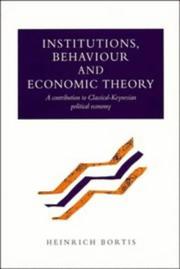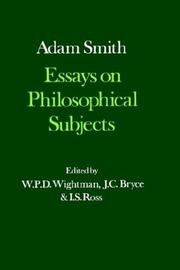| Listing 1 - 10 of 54 | << page >> |
Sort by
|
Book
ISBN: 2919694677 Year: 2016 Publisher: Paris : Éditions Matériologiques,
Abstract | Keywords | Export | Availability | Bookmark
 Loading...
Loading...Choose an application
- Reference Manager
- EndNote
- RefWorks (Direct export to RefWorks)
Dix ans et une crise économique majeure après sa première publication (aux PUF), le présent ouvrage revient, dans une version revue et augmentée, sur l'urgence d'interroger les sources des critiques du libéralisme afin d'évaluer la pertinence des attaques qui sont portées contre lui. L'appareil conceptuel des matrices des théories critiques est en effet ressaisi au seuil de l'ère industrielle naissante au XIXe ?siècle? : en voyant les pensées marxiste, historiciste, utilitariste (marginaliste) de l'espace continental germanophone prendre l'économie politique classique britannique pour cible, on lit les premiers actes d'un procès dont les attendus n'ont pas encore été tous rendus à l'heure actuelle. Même si la discipline économique a depuis longtemps écarté la « valeur-travail » ou la « monnaie, voile?des échanges réels », il demeure en discussion des principes méthodologiques (atomisme, rôle de l'homo economicus) et des positions pratiques (qui étaient favorables au libre-échangisme, dans l'école de Manchester, ou à la puissance continentale, dans la Nationalökonomie). À l'origine de ces débats se tenaient Marx, Menger et les représentants de l'École historique allemande, opposés au dogme des héritiers de Smith, Ricardo, Say et Mill. « Juste salaire », « valeur-utilité subjective » et « économie du peuple » (Volkswirtschaftslehre) fondèrent les matrices alternatives au classicisme. Leurs échecs patents et leurs potentialités latentes marquèrent la marche de leur siècle, du suivant et orientent encore le nôtre. Si l'économie politique classique appartient sans doute à l'histoire de la pensée économique, si le philosophe a le goût du passé, c'est pour mieux comprendre le présent, et ces matrices critiques fournissent dès lors l'aune à laquelle juger des discours redevenus d'actualité.
Book
Year: 2021 Publisher: Berlin : Duncker & Humblot,
Abstract | Keywords | Export | Availability | Bookmark
 Loading...
Loading...Choose an application
- Reference Manager
- EndNote
- RefWorks (Direct export to RefWorks)
Sowohl in Expertenkreisen als auch in der Öffentlichkeit wird schon länger kontrovers über die anhaltenden Niedrigzinsen diskutiert. Liegt die Ursache dieser Niedrigzinsphase an der ultralockeren Geldpolitik der Zentralbanken oder sind die Zentralbanken selbst Getriebene einer bereits länger bestehenden realwirtschaftlichen Entwicklung, die man mit dem Begriff »säkulare Stagnation« charakterisieren könnte? Die These von der säkularen Stagnation ist eng mit dem amerikanischen Ökonomen Alvin Hansen verbunden, der das Thema in den späten 1930er Jahren aufwarf. Allerdings haben sich bereits klassische Ökonomen wie D. Ricardo und J. St. Mill damit befasst. Im vorliegenden Band werden Vergleiche zwischen älteren und jüngeren Erklärungsansätzen wirtschaftlicher Stagnation und Deflation vorgestellt.»Theories of Economic Stagnation and Deflation« Originally, the idea of secular stagnation was proposed by the American economist Alvin Hansen in the late 1930s. In 2013, Larry Summers took up this idea in a speech to the IMF. Classical economists such as D. Ricardo and J. St. Mill have also dealt with this topic in detail. This volume presents comparisons between older and more recent approaches explaining economic stagnation and deflation.
Classical school of economics. --- Political Science. --- Political science.

ISBN: 0521570557 052102899X 051158234X 0511001215 9780511001215 Year: 1997 Publisher: Cambridge : Cambridge University Press,
Abstract | Keywords | Export | Availability | Bookmark
 Loading...
Loading...Choose an application
- Reference Manager
- EndNote
- RefWorks (Direct export to RefWorks)
This book is about the conceptual foundations of an intermediate way between liberalism and socialism: a synthesis of classical (Ricardian) and Keynesian political economy. Classical theory deals with proportions between individuals or collectives and society in tackling problems of distribution and value. Keynesian theory is concerned with the scale of economic activity as explained by effective demand. The economy considered is primarily a monetary production economy, not a market or a planned economy. The author sets up a system linking political economy with other social sciences, i.e. sociology, law and politics in the traditional sense, thus establishing the unity of the social sciences. To complete the picture, issues of method associated with the theory of knowledge in the social sciences and the problem of linking theory with historical reality are also covered.
Classical school of economics. --- Ecole classique d'économie politique --- Keynesian economics. --- Institutional economics. --- Social sciences --- Keynésianisme --- Institutionnalisme --- Sciences sociales --- Philosophy. --- Philosophie --- Economic policy. --- Business, Economy and Management --- Economics --- Classical school of economics --- Institutional economics
Book
ISBN: 3030760960 3030760952 Year: 2021 Publisher: Cham, Switzerland : Springer,
Abstract | Keywords | Export | Availability | Bookmark
 Loading...
Loading...Choose an application
- Reference Manager
- EndNote
- RefWorks (Direct export to RefWorks)
Book
ISBN: 3428547888 342814788X 3428847881 Year: 2016 Publisher: Berlin, [Germany] : Duncker & Humblot,
Abstract | Keywords | Export | Availability | Bookmark
 Loading...
Loading...Choose an application
- Reference Manager
- EndNote
- RefWorks (Direct export to RefWorks)
Economics --- Classical school of economics --- History --- Classical economics --- Individualist school of economics --- Orthodox school of economics --- Schools of economics
Book
Abstract | Keywords | Export | Availability | Bookmark
 Loading...
Loading...Choose an application
- Reference Manager
- EndNote
- RefWorks (Direct export to RefWorks)
Classical school of economics --- Economic development --- Ecole classique d'économie politique --- Développement économique --- History. --- Histoire

ISBN: 0198281870 9780198281870 Year: 1980 Volume: 3 Publisher: Oxford : Clarendon press,
Abstract | Keywords | Export | Availability | Bookmark
 Loading...
Loading...Choose an application
- Reference Manager
- EndNote
- RefWorks (Direct export to RefWorks)
Philosophy --- Economics --- Classical school of economics --- Early works to 1800 --- Smith, Adam, --- #GROL:SEMI-1-05'17' --- Economics - Early works to 1800 --- Smith, Adam, - 1723-1790
Book
ISBN: 3428549880 3428149882 3428849884 Year: 2016 Publisher: Berlin, [Germany] : Duncker & Humblot,
Abstract | Keywords | Export | Availability | Bookmark
 Loading...
Loading...Choose an application
- Reference Manager
- EndNote
- RefWorks (Direct export to RefWorks)
Economics --- Classical school of economics --- History --- Smith, Adam, --- Classical economics --- Individualist school of economics --- Orthodox school of economics --- Schools of economics
Book
ISBN: 3642426328 3642003230 9786612832680 3642003249 1282832689 Year: 2010 Publisher: Heidelberg ; New York : Springer,
Abstract | Keywords | Export | Availability | Bookmark
 Loading...
Loading...Choose an application
- Reference Manager
- EndNote
- RefWorks (Direct export to RefWorks)
This book on Classical micro- and macroeconomics collects revised versions of papers which were written between 1983 and 2000, some jointly with coauthors, and it supplements them in a coherent way with recent unpublished work on the issues raised and treated in them. It attempts to demonstrate to the reader that themes of Classical economics, in particular in the tradition of Smith, Ricardo and Marx, can be synthesized into a coherent whole from the perspective of formal model building as well as applied Leontief-Stone Systems of National Accounts and the Input-Output approaches built on them. This reformulation of Classical economics differs significantly from the static Neoricardian formalization of the Classical approach to economics. In these days when the properly working of the market has become controversial, it is worth going back to classical economics and to study of how the classical dynamic mechanisms, for example the invisible hand in the sense of Adam Smith, were supposed to work to bring about stability, equilibrium and welfare. Having written many books and research papers on the dynamics of market economies, Peter Flaschel very competently takes on this issue in this current monograph. This book will definitely play an important role of reviving classical micro- and macroeconomic dynamics. Willi Semmler, New School University, New York This book is a must-read. It provides a comprehensive, original analysis of classical theories of prices, values, and distribution, which combines the utmost theoretical and mathematical rigour with a significant empirical orientation. Indeed, it outlines the foundations of an alternative analysis of capitalist economies and it is likely to become a classic for all scholars dissatisfied with standard approaches. Yet any open-minded economist would find that the arguments provided have the rare quality of challenging a number of long-held beliefs. Roberto Veneziani, Queen Mary University of London.
Classical school of economics. --- Macroeconomics. --- Microeconomics. --- Classical school of economics --- Microeconomics --- Macroeconomics --- Business & Economics --- Economic Theory --- Economics. --- Economic theory --- Political economy --- Classical economics --- Individualist school of economics --- Orthodox school of economics --- Economic theory. --- Macroeconomics/Monetary Economics//Financial Economics. --- Economic Theory/Quantitative Economics/Mathematical Methods. --- Schools of economics --- Social sciences --- Economic man
Book
ISBN: 0631129081 Year: 1982 Publisher: Oxford Blackwell
Abstract | Keywords | Export | Availability | Bookmark
 Loading...
Loading...Choose an application
- Reference Manager
- EndNote
- RefWorks (Direct export to RefWorks)
Macroeconomics --- Economic schools --- Monetary policy --- Keynesian economics --- Classical school of economics --- Macroéconomie --- Politique monétaire --- Keynésianisme --- Ecole classique d'économie politique --- Macroéconomie --- Politique monétaire --- Keynésianisme --- Ecole classique d'économie politique
| Listing 1 - 10 of 54 | << page >> |
Sort by
|

 Search
Search Feedback
Feedback About UniCat
About UniCat  Help
Help News
News